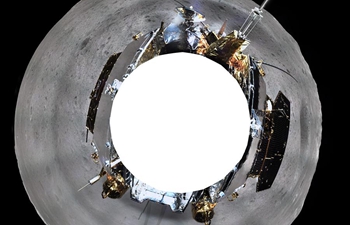HAVANA, Jan. 13 (Xinhua) -- China is the global leader in space exploration, a Cuban geophysicist and science popularizer has said.
The landing of the Chang'e-4 probe on the far side of the moon on Jan. 3 is an important milestone in the exploration of the Earth's natural satellite, Bruno Henriquez told Xinhua in an interview.
"It is something very significant, because it is the first time that there is a soft landing on the far side of the moon, which can be explored in site and not from the lunar orbit," he said.
Russian, U.S., Japanese and Indian spacecrafts had explored that part of the moon from the lunar orbit, but none have landed there before.
Henriquez also praised the fact that the Chinese probe landed on the moon's Von Karman crater in the South Pole-Aitken basin, and China's excellent deployment of the Yutu remote-controlled vehicle.
"The Chinese are today on top in terms of outer space exploration, not only in launching spacecraft, but also in their approach to the space program and everything they have developed on land to support it," Henriquez said.
The science fiction writer and former researcher at Cuba's Institute of Geophysics and Astronomy believes that Western mainstream media remains an outdated narrative that claims China lags behind the United States in space.
"They have accomplished many things, such as the first quantum communication satellites. They have the largest radio telescope on earth of the spherical reflector type, very similar to the one at Arecibo (Observatory) in Puerto Rico," he said.
China's scientific achievements have motivated Henriquez to create a collection of popular science books about everything related to space exploration, including the development of rocketry, the number of manned space flights, China's taikonauts and new uses for satellites.
"It is an attempt to show that China has a very intense policy of scientific development, of which the space program is just one facet," Henriquez said.
Henriquez is about to release a book on China's successful space program, which highlights China's development of its own space technology, remote sensing, remote control and autonomous exploration robots.

















